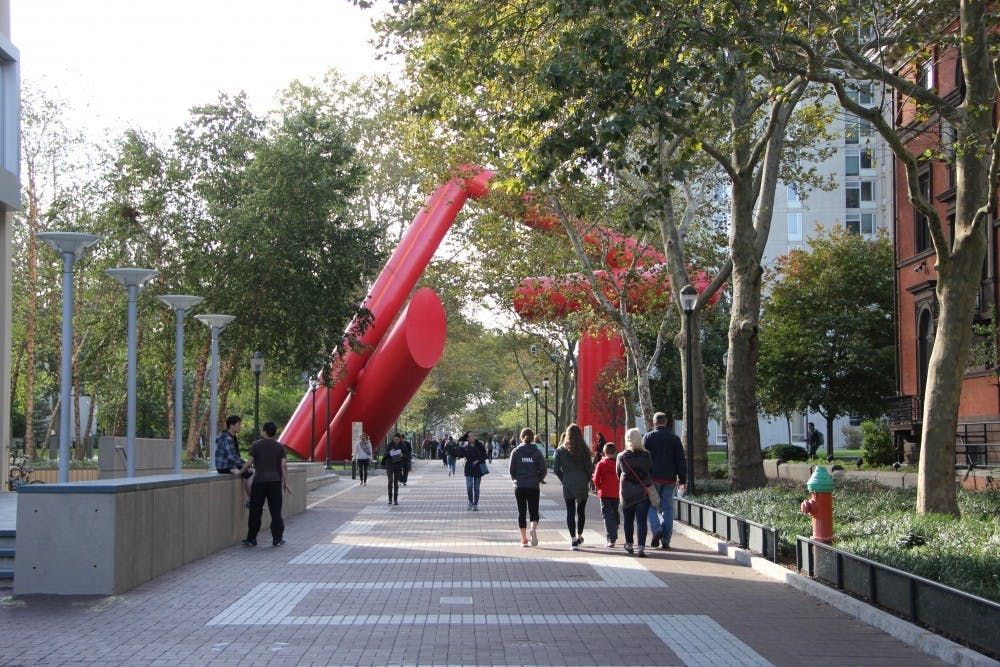An animal café, an app that provides walking routes in the area, and embedded Counseling and Psychological Services clinicians in all four undergraduate schools are among ideas being considered by Penn to improve mental wellness on campus.
Penn launched the “Your Big Idea” challenge on Feb. 4, calling on all Penn-affiliated people to submit ideas to enhance mental wellness at Penn. After submissions closed on March 1, a committee of students, faculty, and staff voted on the ideas in mid-March and selected 14 semifinalists out of 444 submissions. The initiative is being led by Faculty Senate Chair and Penn Nursing professor Jennifer Pinto-Martin and Chief Wellness Officer Benoit Dubé.
Selected semifinalists are now formalizing their pitches in collaboration with Penn Medicine Center for Health Care Innovation staff and will give three-minute pitches during a “Big Idea Pitch Event” to the public on April 25.
At the event, audience members will vote for their favorite pitches in real time, and a panel of judges, consisting of administrators and student government leaders, will decide on the finalists. The finalists will sharpen their ideas over the summer for implementation in the fall.
Semifinalist and fourth-year nursing Ph.D. candidate Matthew Lee, who is also chair of the Graduate and Professional Student Assembly’s Student Life Committee, submitted more than 30 ideas for the challenge. Lee said he was given the option to choose between two of his ideas to formulate a pitch for the Big Idea Pitch Event, and decided in favor of presenting an animal cafe.
“Puppy therapy is one of the most well-attended events of all the wellness stuff,” said Lee, who heads GAPSA’s wellness programming. Penn students need a space outside of the gym or Counseling and Psychological Services where they can destress, he added.

Fourth-year nursing Ph.D. candidate Matthew Lee, who is also Chair of the Graduate and Professional Student Assembly’s Student Life Committee, will present an animal cafe for the Big Idea Pitch Event after seeing the success of puppy therapy events on campus. (File Photo)
Lee plans to partner with the Philadelphia Animal Welfare Society, which faces issues in finding people to adopt dogs. He added that other providers charge $150 per hour with each animal. Lee said he envisions housing the animal cafe in the student-run Williams Cafe.
RELATED:
Gutmann announces 2019 President’s Engagement and Innovation Prize winners
Penn ranked fourth most innovative university in world, following Stanford, MIT, Harvard
Semifinalist Laurie Actman, Chief Marketing, Communications, and Programs Officer at the Penn Center for Innovation, proposed creating “Penn Walks,” which would suggest walking routes around Penn and Philadelphia. The app will also offer podcasts during walks from notable Penn psychologists such as Adam Grant and Angela Duckworth, and will include options to attend weekly walking tours.
Penn Walks would increase wellness by providing an accessible, low-cost way to exercise, connect with others, and explore areas of Philadelphia unknown to many Penn students, Actman said.
Both Lee and Actman envision partnering with other semifinalists who also have ideas related to animal therapy and walking. The goal is to “leverage as many of the existing resources as possible,” Actman said.
Semifinalist and College freshman Mary Sadallah is preparing to pitch an embedded CAPS model across schools, which would place a CAPS clinician in each of Penn’s four undergraduate schools to serve the school’s students.
Sadallah and other members of the Undergraduate Assembly have been in talks with the administration to potentially implement the embedded model across all schools at Penn since Wharton students received their own clinician in Huntsman Hall last year. Dubé and school administrators told The Daily Pennsylvanian they wanted to collect more data before extending the program to all undergraduate schools.
Sadallah said while the administration has been open to the embedded model across schools, no one person has committed to heading the project.
“[I’m showing them] I’m committed to the process,” Sadallah said. “It’s been up in the air for so long.”
Because individual schools like Wharton have to fund their own clinician, implementation for all four undergraduate schools has faced barriers, Sadallah said. She added that the funding received from the Big Idea Challenge could help offset those costs.
Dubé said there is not a predetermined number of winners for the challenge and that the number depends on the amount of funding required for each project.
The semifinalists will be judged on five rating criteria to avoid bias from the judges. Examples of rating criteria include the number of Penn-affiliated people it will impact and how long the semifinalists will be at Penn to implement the project, Dubé added.
"In those three minutes you have to show that this is not just a last-minute put together idea, but this is an idea that has legs, that has sustainability, that can be impactful," Dubé said.
Deputy News Editor Julie Coleman contributed reporting.









